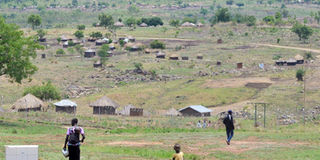Activists raise alarm over loss of tree cover

Imvepi Settlement Camp in Terego District that is now having a depleted environment. PHOTO | FELIX WAROM OKELLO
What you need to know:
- The country loses 120,000 hectares of forest cover annually, according to environmentalists.
Environmental activists have warned that Ugandans will continue to suffer the severe effects of climate change, including prolonged droughts unless the country embraces environmental conservation measures such as tree planting.
Speaking at the end of the climate change run organised by Tree Adoption Uganda (TAU) in Kampala yesterday, TAU’s executive director Charles Batte said Ugandans should not simply look on as the country continues to lose 120,000 hectares of forest cover annually.
“Tree planting is something that must be taken seriously by all stakeholders to create an environment where people and nature flourish. We have started raising awareness on tree growing and also raising funds to support tree planting,” Mr Batte said.
He revealed that the organisation is mobilising funds to procure and plant 100,000 trees across the country to contribute to efforts intended to restore the country’s forest cover.
Forest cover
Uganda Forestry Authority indicates that the country's forest cover decreased from 54 per cent in 1900 to 12.4 per cent in 2017, meaning that 2.4 million hectares of forest cover were lost during that period.
Early this year, Mr Tom Obong, the executive director of NFA, said Ugandans must practice agroforestry to save the country from losing all its forest cover by 2040 due to unsustainable human activities, including charcoal burning.
Ms Flavia Karungi, a forester by profession, said encroachment on forest reserves, including Budongo and Bugoma has not only affected rainfall patterns but also affected tourism.
“People have decided to cut down trees for timber and burn charcoal in order for them to survive. Nowadays, there is prolonged drought because trees that help in rainfall formation have been cut down. Eco-tourism services have equally been affected. When you cut down the trees, animals run away and wildlife conservation becomes hard, which in turn affects the tourism sector,” Ms Karungi said.
She said all Ugandans, including children should be encouraged to plant trees to minimise the effects of climate change.
Mr Robert Kabushenga, a former media manager, said if each Ugandan planted a tree, the country’s forest cover would be increased by 45 million trees.
While addressing participants during the launch of Biodiversity Conservation Commitments in Kampala in May, the State Minister for Energy, Mr Sidronius Okaasai, said poor regulation of charcoal burning and firewood exploitation have greatly contributed to tree cover loss and biological resources of which 60 percent (72,000 hectares is due to charcoal burning and firewood).
He revealed that the energy needs of over 80 percent of Ugandans are dependent on biomass.
Biomass is the burning of renewable energy sources generated from burning wood, plants, and other organic matter.
Last month, an Executive Order headlined as Number 3 of 2023 imposed a ban on charcoal burning and business in northern and northeastern Uganda.




